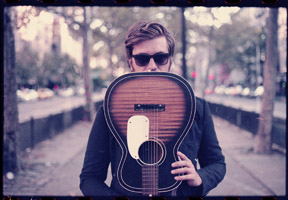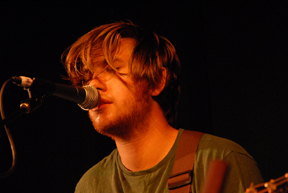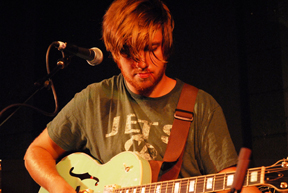


(credit: Eric Ryan Anderson)
Troubadour Bobby Long talks with Pollstar about his new album, being an Englishman in Brooklyn, how he likes to record albums quickly and how every show “is a big deal.”
Pollstar last spoke with Long in September 2010, just a few months before his first studio album, A Winter Tale, was released. At that time the young singer/songwriter had just moved to Manhattan and was preparing to go out on the road supporting Michael Franti.
Three years later Long has moved once again, having recently set up new digs in Brooklyn. He released his second studio album, Wishbone, on ATO Records earlier this year, an effort that prompted the New York Daily News to write, “He created songs with a blunt force, using melodies that engage and a voice that’s rife with hunger.”
But Long’s activities haven’t been confined to music. In 2012 he published a collection of his poetry in a book titled “Losing My Brotherhood.”
Long has logged many touring miles since last talking with Pollstar,opening for Steve Winwood, Iron & Wine, Brett Dennen and Rodrigo y Gabriella. He has also played several major festivals, including Bonnaroo, Austin City Limits and Dave Matthews Caravan. In fact, you could say Long is the epitome of the working artist – record, tour, record, tour, repeat.
But one of Long’s most important gigs in 2013 just might be when he appears at Seattle’s Tractor Tavern Aug. 20. Working with Seattle non-profit Melodic Caring Project, Long’s performance will be streamed to hospitalized children. Sure, it’s a tough audience, but after hundreds if not thousands of shows, we’re betting Long’s words and music not only will keep them captivated but his easy, down-to-earth demeanor will keep them smiling long after his final encore of the evening.

(Sharon Weisz)
“I want to record an album really quickly. I want the pressure of, Hey, let’s make a record in a month.’ For me, that makes it better. The focus is there and it’s more direct.”
|
|---|
The last time we talked, you had just moved to Manhattan. How are you spending your free time in Brooklyn?
I’ve got lots of friends in Brooklyn. I play guitar and write. … Take my dog for a walk, hang out with friends.
We’ve talked with a few country musicians who grew up in places like Cleveland or Baltimore, yet they sound like they were born and raised in Tennessee. Do you ever feel like you’re losing your British accent?
No. It was weird. Me and my band … had that conversation last night. I don’t think I have [lost the accent]. I have a lot of English friends here and it’s hard to shake it off. I find myself correcting myself, calling a pavement a sidewalk … but I definitely don’t think I’m losing my British accent.
The band you’re working with these days – are they the same musicians who played on Wishbone?
No, it’s different, actually. The guys on the Wishbone record … they’re busy guys, older, too. They’re playing with Sara Bareilles … They’re their own band, too. I wanted to get a band maybe a bit closer to my age. … So I got a new band and it’s looking great so far.
How did you assemble the new band? Were they an existing group looking to back a singer, did you hold auditions or were they musicians you already knew?
I got really lucky. The process was much shorter than I thought it would be – two months of rehearsing with different people and seeing who would fit. I spoke to a couple of people I know. I asked my producer and he found a bass player … and drummer. I knew a friend who wanted to play guitar. It was easier than it should have been.
Now that you have two studio albums under your belt, what differences do you see between them?
I think they have the same basic [feeling] behind them … the songs come first and as much live recording as possible. The first one was slightly rawer than the second one. There are six and seven minute songs on the first one. The second record, I tried to push myself, writing wise. … I wanted every chance of being played on the radio, too, but not in a poppy way.
I spent more time with the second one. I like them equally. With more time we were able to write more parts, look at layers and get people in here.
On the first one we had five musicians and we had a week. We were recording two songs a day. I love doing it that way, but this way was slightly better for orchestrating everything.
Many musicians say they have their entire life to write their first album but only 18 months to write the second. Does that apply to you and the Wishbone sessions?
I have a lot of musician friends who felt enormous pressure with the second one. Because there’s that shift in time. You have all the time [writing the first album]. I certainly didn’t feel any [pressure]. I write every day. I had a lot of songs for the second one, too. I write when I’m on the road.
I also like the pressure. I want to record an album really quickly. I want the pressure of, “Hey, let’s make a record in a month.” For me, that makes it better. The focus is there and it’s more direct.
Are there songs in the vault that didn’t make Wishbone but might be released some day?
There’s one or two that I never recorded. It’s really hard when you have all this stuff that’s new and exciting and you have two things that are slightly older. They often sound as if they don’t quite go together. I like putting something out that’s a complete thing from top to bottom and comes from the same idea or the same … time or place. I’ve written 25 new songs for the next record but there’s also one or two I’ve written before that I really, really love. I thinking … about the possibility of recording them.
Has there been any singular moment where you felt you could make a career playing your music?
Whenever I’m really nervous about something it’s a big deal. Every show is a big deal. If you’re playing on TV or doing a support thing in front of people. Or if someone comes around that you need to impress. I’m looking at myself in the mirror before I go on stage, saying, “Oh, my God, I think I’m going to be sick. I feel terrible. I don’t feel comfortable. I feel really nervous.”
Then you walk off stage [after] doing a good job. I always feel, “Well done. You can do it. You’re stupid for thinking otherwise.”
I was thinking about this last night. All day I was feeling tired and wanted to sleep. I thought, “Wow. What’s wrong with me?” I was worried about [the show] that night.
Then, just before we went on I wouldn’t sit down. I got on stage and I forgot the first line to the song. I kept searching for it. Then I opened my mouth and it came out. Walking off stage I was thinking, “I can do this. I was an idiot thinking otherwise.”
About how many songs have you written?
I’ve written a lot. They’re not all good. They’re not all outstanding.
Is it the mark of a young artist to remember all the lyrics? After all, artists that have been performing for 20 or more years are relying on teleprompters.
I would love a teleprompter. When I was on tour with Steve Winwood, he had an iPad on top of his organ. I was watching Ryan Adams recently, and he has a songbook that he takes out [and puts] in front of him. It’s a great idea. Musically, I’m good. I feel I remember everything. But lyrics …
I did a poetry book last year. That really threw me under the bus. You got like 100 poems worth of stuff running around through your head. I feel like I’m going to need to get a book together of my lyrics. Especially when I’m on my own I can get away with it, when it’s not such a rock ’n’ roll show.
You’ve toured as a solo act and with a band. Do you think you’ll continue performing both ways?
I like … them both. I’m lucky that I can. Some people in bands feel uncomfortable playing on their own. But I feel … that I’m kind of good at both. This tour I’m going to do, I’m just doing it with Rob Dwyer (Kalob Griffin Band) who plays banjo, mandolin and a guitar. He’s just going to accompany me a little bit [on this tour].
Most of this year we’ve gone on tour for a few months and I was doing [solo] shows here and there. I just felt like playing on my own a bit. Financially, as a musician, it means I can survive doing it. It must be incredibly hard for musicians out there who play in bands and split the money four or five ways. I can make a living from doing it. So I just feel lucky I can do it.

(Sharon Weisz)
“I feel like every album I’ve made is different and I’m not scared ofthat. ... The next record I want to make is different from Wishbone and different than I’ve done before.” |
|---|
Do you believe in luck?
Yeah. You have to, I think, if you work at anything in the entertainment industry. Everything is relying on somebody looking at you and taking a chance on you. You’re not necessarily the best out there but they see something. You’re the one that they want. Whether it’s a tour, a record deal or a chance of coming to a show. Your [career is] in the hands of other people.
Actors … for some reason they’re cast in the perfect role and then they’re a superstar. But you have to get yourself to a point of opportunity. That does involve luck. The reason I am able to do what I do today on whatever level I’m doing it is because I work my ass off. But at the same time I’ve been fortunate that somebody has taken a chance on me and people have come back and come back to my shows. I definitely feel lucky. There are musicians out there who don’t get to do it, never get to do it. Artists who make great art that are stumbling around looking for jobs. It’s hard not to feel fortunate. We’re all lucky, sometimes.
What would you like to accomplish in the future? Just to throw a few things out there – would you like to do a concept album, co-headline with someone you admire?
I feel like every album I’ve made is different and I’m not scared of that. I love people like Neil Young because they just make records they want to make. The next record I want to make is different from Wishbone and different than I’ve done before. A concept album would be a great thing, an amazing thing to do.
I would also love to play guitar for a band and tour and see that side of it.
You would be one of the musicians in the band?
Yeah. Play guitar, smoke a pack of cigarettes. … Just concentrate on my guitar playing. I would like to do that. I would like to produce my own record and produce someone else’s, too.
I recently saw a video featuring you performing with singer/songwriter John Fullbright and it really appeared as if both of you complement each other on stage. Who would you like to play with?
Jam with, share the stage with? Steve Winwood is incredible. I got to jump on stage with his band. A lot of them are jazz guys and I hung on for dear life.
My girlfriend’s best friend got married and they asked me to sing at the wedding. They asked me to sing Ray LaMontagne’s “You Are The Best Thing,” and I said no, I didn’t want to do it because I was so nervous singing a cover, someone else’s song.
The band was incredible. It was like an eight-piece band with horns. I ended up jumping on stage and doing a few other songs. My girlfriend accused me of showing off at the end.
As an artist, are there times when you feel that people who are not performers themselves or involved with show business in any way, might not understand you?
Yeah, but I also feel that goes the other way, too. My friends who work, doing the jobs they do, I have no idea what it feels like. I definitely don’t feel elevated doing what I do. I don’t really feel that there is only one way [to live your life]. I don’t walk down the street and go, “Nobody knows how emotional I feel today,” or “Nobody knows what it’s like to [perform] on stage and get nothing back.”
The really big … misinterpreted thing about doing music, probably more so than any other [form] of entertainment is that you’re not a millionaire. All musicians are struggling except for that five percent. I feel like poets are expected to struggle, actors are expected to struggle. Comedians, too. … But musicians, just because you go on tour, have a name, a record deal … they instantly think you’re rolling in it. Which is not the case at all. Swimming teachers make more than a lot of musicians.
I have a friend who wanted to be an actress all her life. She was always talking about it. A really blind focus – which is what you need to do anything. She just recently packed it in, said, “I’m done with it.”
She says, “How are you doing?” And I [answer], “I’m doing good. I love what I’m doing. Some ups and downs like any other job.”
And she’s like, “Yeah, right. It must be hard to be a millionaire.” And I’m like, “What?”
My girlfriend’s mom, we were talking about buying houses and how it’s different from her generation to my generation. The way finances are now, it’s hard to buy a house. And she says, “Well, can’t you call up People magazine and be on the front cover?”
What’s the best bit of advice anyone has given you during the past few years?
To just write. I supported Sam Beam of Iron & Wine for a few shows, which was great. In Chattanooga he came into my dressing room and asked me what I was doing after the tour and I said, “My album has just been pushed back two months because of scheduling.” I was fine with it but I was a bit frustrated. I was looking forward to hitting the road.
And he was like, “Good. You can write.” That’s the most important thing.
As a songwriter, you have to write. You have to learn your craft, look forward to it and play around with it.
Please visit BobbyLong.info for more information.